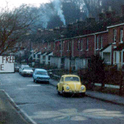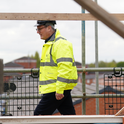In 1983 your chance of owning your own home was over 70 per cent for people aged between 29 and 49. In 2012 the lucky group who had a 70 per cent or more chance of owning their homes were aged 58 to 85. Home ownership and rapid house value inflation was a “bonus” won by just one generation. And yet a secure home is one of the most important factors influencing wellbeing. We need to make it available to all.
In the distant past most people did not buy their own home. Even in 1983 a majority of those aged over 50 were renting from the local council or from the remnants of the old private rented sector. Council housing, and regulated private sector rents, had put slum landlords out of business. People saw the quality of their housing improve. Now, as a result of the “right to buy” policy, the total social housing stock is much smaller. Quality today improves only for a minority, while many others live in increasingly overcrowded property, often poorly maintained by its private landlord.
The mortgage market grew in the 1980s, along with a new private rented market for students and young professionals. By the 1990s fewer older people rented, but younger people were increasingly unable to get mortgages and the private rented sector expanded rapidly. With the economic crash in 2008, it became even harder for first-time buyers, but surprisingly easier for buy-to-let landlords. Most people aged 25 to 50 were renting again, but now mostly from private landlords. Private tenants doubled between the 2001 and 2011 censuses, from 5 million to 10 million across the UK.
Since 2010 council tax benefit has been cut all across the UK, and rent, gas and electricity costs have gone up. A quarter of British households, mostly with children, can no longer pay for rent, fuel and food and manage to save at least £10 a month. Relying on charities to help feed the poorest through food banks shows that this government views such activities—being able to live a decent life—as discretionary.
People will go without food and adequate heating before they fail to pay the rent. And yet in London, court summonses for not paying the rent doubled from 7,283 in 2013-14 to 15,509 in 2014-15, and there was a 50 per cent increase in the use of bailiffs. In the UK you pay for your own eviction: £125 in court costs and £400 in bailiff’s fees.
Over half a million children in London are now living in poverty. Most of their parents are now privately renting. When their families are evicted, or just move because they cannot afford the rising rents, the children also often have to move school, thus losing friends. Children in poverty and in private rented accommodation move, on average, more than once every three years. London’s recent amazing state school exam result improvement may well soon suffer.
Our government needs to accept its responsibility for the quality and security of rented housing and the quantity of socially rented housing, become involved in rent regulation and bring under control the frenzied buying of properties by buy-to-let landlords. The standard length of private rented tenure in the UK should be three years, or five years for people with, or who subsequently have, children. Rents should be fixed during this period. Social housing rents should not be more than 30 per cent of disposable income. Tenants such as students could leave their tenancy earlier, but landlords could not insist that they do. Tenants should have the right to improve persistently substandard accommodation, deduct the cost from their rent, and extend the length of their tenancies in proportion to how much they have had to spend. That would ensure our housing stock was improved. Existing laws are simply not good enough.
Housing still needs to be built, but in recent years the private sector has failed to build despite sky-high house prices. A great deal of building would be better coordinated if it were done under the supervision of the state, which can coordinate transport links and other infrastructure. We need attractive retirement apartments with lifts near to where people’s children live, and homes in and near cities where people will not need so many cars.
Housing has made some people very rich—though often only on paper. Since 2010, 207,000 more people in the UK became paper millionaires, mostly because the market value of their property had risen; this is potential wealth that can only come from the next generation in higher rents or huge mortgages. High property and private pension wealth do not make people happier. Recent surveys show that quite small amounts of liquid wealth correlate with higher personal well-being—having savings for a rainy day makes people more secure and happier. Yet a quarter of UK households can save nothing at all, and another quarter almost nothing. And having a house whose value has topped a million pounds contributes little to a sense of real happiness.
Above the paper millionaires are those receiving each year a share of the £42 billion paid in bonuses in the UK. Mostly these are bankers or individuals who work in closely related financial service industries. Most bankers feel their own bonus is small compared to the hundreds of thousands of pounds received by a few. And even these few feel poor compared to the wealthiest 1000 families in the UK, who have doubled their wealth holdings since 2010. Self-perceptions of wealth are all relative.
The UK is now ranked third, just below the much more populous China and the US, in terms of the “ultra high net worth individuals” who live there—those with wealth worth over $50 million. Worldwide inequities between those at the very top and the rest are rising increasingly rapidly. As the chief executive of Oxfam said: “This is the latest evidence that extreme inequality is out of control. Are we really happy to live in a world where the top 1 per cent own half the wealth and the poorest half own just 1 per cent?”
Annual wealth taxation is needed. Property taxation should be progressive. A flat tax on the value of property owned or proportional to total land value are less radical options. Saving small amounts should be encouraged and property speculation discouraged. The Child Trust Fund, now cut, reduced some wealth inequalities. Less inequality results in more security for all.
The British Academy is hosting a debate titled "Inequality: Good for the rich, bad for the economy?" in Edinburgh on 4th October. The event is in association with Prospect.
A secure home is vital to wellbeing—all should have one
The government must accept responsibility
September 26, 2016

Houses in south east London ©Dominic Lipinski/PA Wire/Press Association Images












